The Fane Valley Co-op which began in south Armagh at the beginning of the last century is now a large supplier of products to farmers and a major processor of beef, sheepmeat and a manufacturer of speciality foods.
While it is centred in Northern Ireland (NI) with headquarters in Moira, Co Armagh, it has a major presence south of the border through the joint venture with ABP in Slaney and Irish Country Meats (ICM).
Through ICM, Fane Valley has sheepmeat processing capability in Belgium with A. Lonhienne and it also has abattoirs in the north of England which supply carcases for processing in its Linden Foods factory in Dungannon, Co Tyrone, all in partnership with ABP.
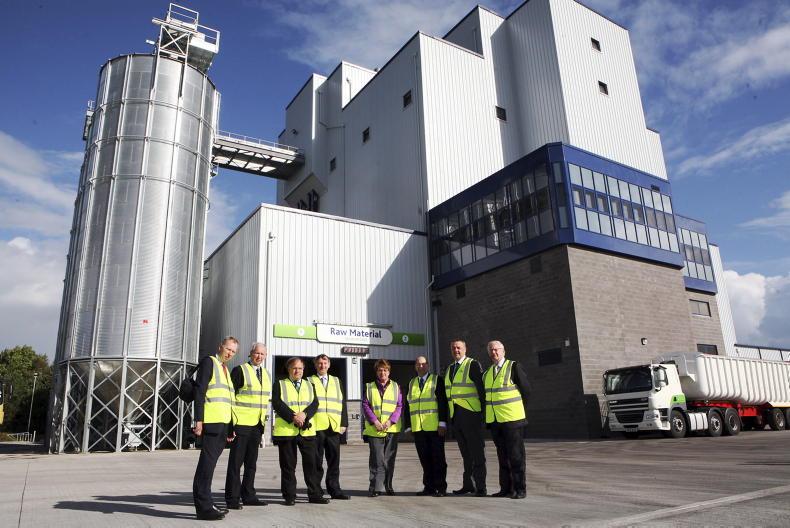
The official opening of Fane Valley Co-op's Stg£18m animal feed mill on the outskirts of Omagh in Co Tyrone. Trevor Lockhart (second from right).
It has speciality meat processing businesses in Silver Hill Duck, Hilton edible offal processors, Duncrue fat processors, Kettyle Irish Foods, and Whites, which has been manufacturing porridge oats since the middle of the 19th century.
Feed mills
The farmer-facing side of the business comprises feed mills in Newry, Co Down, Omagh, Co Tyrone, and Ballindrait, Co Donegal. Between them they produce 450,000t of animal feed annually, making Fane Valley the second largest miller on the island of Ireland.
They also have 17 stores across NI supplying farm requisites with a comprehensive website providing online access to these stores and a delivery service.
The group employs 3,000 people, split evenly between the UK and Republic of Ireland/Belgium.
Borders hurt business
Given the nature of the business, it was little surprise that Lockhart’s first comment on Brexit was that borders of any type don’t work, either on the island of Ireland or on trade between Britain and the island of Ireland.
Rewinding to last autumn and the daily debate of will there or won’t there be a deal, he was delighted to welcome the deal that did eventually arrive because despite its shortcomings, the alternative would have been worse.
The Fane Valley business depends on seamless trade on the island of Ireland, and both ways with Britain, to function.
The most high-profile example of this was probably providing beef for the State banquet during the royal visit to Ireland in 2011.
Beef from a Co Wexford farm was processed in Slaney before coming north to Co Fermanagh for the salt moss dry aging process and final cutting and preparation in Kettyle Irish Foods, also part of the Fane Valley Co-op. In what was a hugely symbolic and historic visit exclusively to the Republic of Ireland, this brought a Northern Ireland element to the occasion.
Silver Hill Duck
The example that Lockhart gave, which best demonstrates the complexities of operating either side of the Irish border, is Silver Hill Duck, whose factory sits alongside the N2 road outside Emyvale in Co Monaghan.
The process begins with eggs from Aughnacloy in Co Tyrone going to a hatchery in Co Monaghan and, from there, the young ducks are placed with grower farms more or less equally either side of the border.
These farms use meal supplied from Fane Valley’s mill in Omagh, Co Tyrone, and all ducks go to Emyvale for processing.
The Fane Valley business depends on seamless trade on the island of Ireland, and both ways with Britain, to function
Onward sale of the duck is then split almost equally between Britain and Ireland, with 20% exported to the EU and beyond.
While Lockhart uses this as the example that best illustrates the complexities of cross-border supply chains, a major concern is the functioning of the protocol that sets the rules for movement from Britain to the island of Ireland.
Like all of the large processors in NI, Linden Foods, the red meat processing division of the Fane Valley ABP partnership, brings carcase beef and sheep in from Britain for deboning and further processing at their Dungannon factory.
The oats processing side of the business has also been disrupted while the consumer and retail difficulties have been well documented.
Lockhart’s view of the NI Protocol which creates the unique trading position of NI with both the EU and UK has to be “risk-based with proportional and pragmatic controls that protect the EU single market parallel to operating within the UK market”.
He goes on to explain the big challenge at present is inbound from Britain to NI because of controls that were designed decades ago that didn’t foresee the scope of technology, as well as being for a different purpose.
Traceability
They do not reflect current product traceability or IT systems.
He accepts that the EU does not want to create a position whereby members can leave and retain the benefits without the downsides, but the uniqueness of NI requires proportionate controls, which enables trade to function without unnecessary barriers.
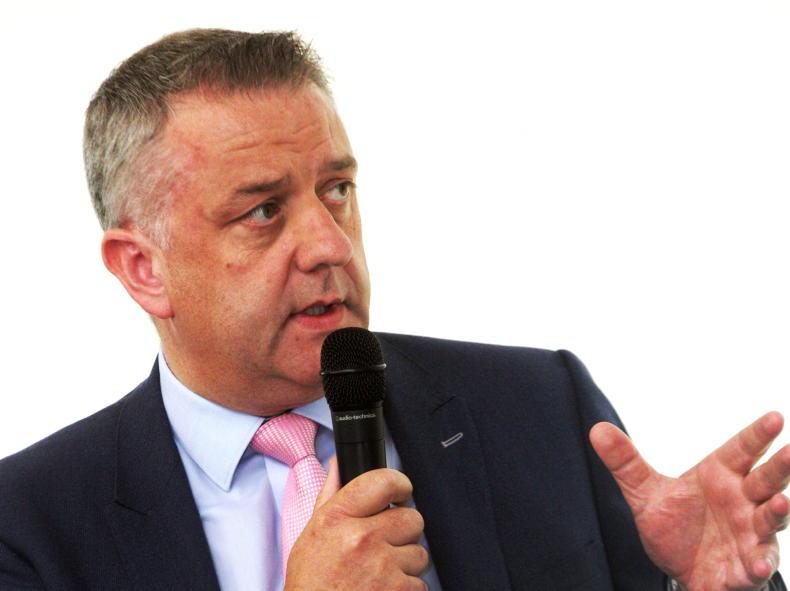
Trevor Lockhart, Fane Valley CEO.
If the EU and UK can get to a workable arrangement, then Lockhart is optimistic about the industry and Fane Valley Co-op’s position in it.
Barriers are an impediment to trade and everything that can be done to avoid them has to be done is his view.
Problem with uncertainty
While the business is now adapting to Brexit, Lockhart regrets the fact that there have been years of limbo while we waited to see what, if any, deal would emerge between the EU and UK post-Brexit.
Business hates uncertainty and that is what Brexit caused since the referendum.
In practical terms, this has meant companies deferring investment decisions on large capital expenditure. This absence of investment meant that company development has been delayed and while there is now a level of certainty that will enable investment to proceed, the lost years are never fully recovered.
“The Brexit outcome isn’t perfect, it was never going to be but at least it has brought some clarity and certainty.”
Government support
Given that Fane Valley operates either side of the Irish border, Lockhart has an insight into how government interacts with industry. He is complimentary of the Irish Government’s strategic plan for agriculture and the industry investment programme announced at the end of 2020.
A similar programme in Northern Ireland awaits the updating of its last strategy for agriculture in 2012 and until this is complete, an investment plan for industry is delayed.
Fane Valley may be a farmer-owned co-op, well into its second century of trading but it is its ability to embrace change and adapt to the current market and trading conditions that are the basis for its sustained success.
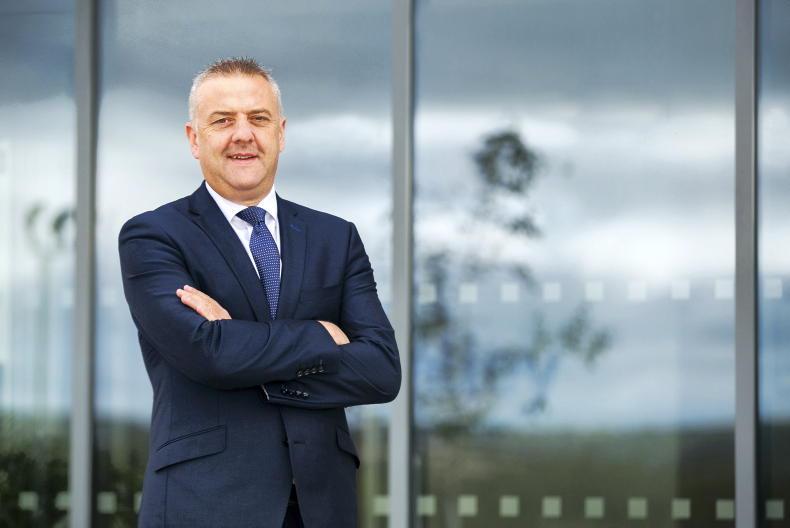
Trevor Lockhart, chief executive, Fane Valley.
In the beginning, it was about collecting and processing milk locally and selling the produce within travelling range of small local creameries.
Fane Valley withdrew from milk processing a number of years ago and focused on building its business around meat processing and milling alongside a thriving farm requisite business across 17 locations in NI.
COVID-19
The farmer-facing side of the business, like the food processing side, incurred extra costs in protecting against COVID-19 but Lockhart is thankful that farming and food processing was able to continue with limited disruption unlike many other sectors of the economy.
Hospitality
The rollout of vaccines and the reopening of hospitality gives Fane Valley optimism for the remainder of this year, and if the EU and UK can agree a suitable and proportionate suite of border controls for trade in and out of Britain, the business is well placed to keep progressing.
Fane Valley is a farmer-owned co-op that operates across Ireland and Britain.It has a joint venture in meat processing with ABP through Slaney Foods, ICM and Linden Foods.It wants pragmatic and proportionate controls for trade between Britain and NI that are risk-based.
The Fane Valley Co-op which began in south Armagh at the beginning of the last century is now a large supplier of products to farmers and a major processor of beef, sheepmeat and a manufacturer of speciality foods.
While it is centred in Northern Ireland (NI) with headquarters in Moira, Co Armagh, it has a major presence south of the border through the joint venture with ABP in Slaney and Irish Country Meats (ICM).
Through ICM, Fane Valley has sheepmeat processing capability in Belgium with A. Lonhienne and it also has abattoirs in the north of England which supply carcases for processing in its Linden Foods factory in Dungannon, Co Tyrone, all in partnership with ABP.

The official opening of Fane Valley Co-op's Stg£18m animal feed mill on the outskirts of Omagh in Co Tyrone. Trevor Lockhart (second from right).
It has speciality meat processing businesses in Silver Hill Duck, Hilton edible offal processors, Duncrue fat processors, Kettyle Irish Foods, and Whites, which has been manufacturing porridge oats since the middle of the 19th century.
Feed mills
The farmer-facing side of the business comprises feed mills in Newry, Co Down, Omagh, Co Tyrone, and Ballindrait, Co Donegal. Between them they produce 450,000t of animal feed annually, making Fane Valley the second largest miller on the island of Ireland.
They also have 17 stores across NI supplying farm requisites with a comprehensive website providing online access to these stores and a delivery service.
The group employs 3,000 people, split evenly between the UK and Republic of Ireland/Belgium.
Borders hurt business
Given the nature of the business, it was little surprise that Lockhart’s first comment on Brexit was that borders of any type don’t work, either on the island of Ireland or on trade between Britain and the island of Ireland.
Rewinding to last autumn and the daily debate of will there or won’t there be a deal, he was delighted to welcome the deal that did eventually arrive because despite its shortcomings, the alternative would have been worse.
The Fane Valley business depends on seamless trade on the island of Ireland, and both ways with Britain, to function.
The most high-profile example of this was probably providing beef for the State banquet during the royal visit to Ireland in 2011.
Beef from a Co Wexford farm was processed in Slaney before coming north to Co Fermanagh for the salt moss dry aging process and final cutting and preparation in Kettyle Irish Foods, also part of the Fane Valley Co-op. In what was a hugely symbolic and historic visit exclusively to the Republic of Ireland, this brought a Northern Ireland element to the occasion.
Silver Hill Duck
The example that Lockhart gave, which best demonstrates the complexities of operating either side of the Irish border, is Silver Hill Duck, whose factory sits alongside the N2 road outside Emyvale in Co Monaghan.
The process begins with eggs from Aughnacloy in Co Tyrone going to a hatchery in Co Monaghan and, from there, the young ducks are placed with grower farms more or less equally either side of the border.
These farms use meal supplied from Fane Valley’s mill in Omagh, Co Tyrone, and all ducks go to Emyvale for processing.
The Fane Valley business depends on seamless trade on the island of Ireland, and both ways with Britain, to function
Onward sale of the duck is then split almost equally between Britain and Ireland, with 20% exported to the EU and beyond.
While Lockhart uses this as the example that best illustrates the complexities of cross-border supply chains, a major concern is the functioning of the protocol that sets the rules for movement from Britain to the island of Ireland.
Like all of the large processors in NI, Linden Foods, the red meat processing division of the Fane Valley ABP partnership, brings carcase beef and sheep in from Britain for deboning and further processing at their Dungannon factory.
The oats processing side of the business has also been disrupted while the consumer and retail difficulties have been well documented.
Lockhart’s view of the NI Protocol which creates the unique trading position of NI with both the EU and UK has to be “risk-based with proportional and pragmatic controls that protect the EU single market parallel to operating within the UK market”.
He goes on to explain the big challenge at present is inbound from Britain to NI because of controls that were designed decades ago that didn’t foresee the scope of technology, as well as being for a different purpose.
Traceability
They do not reflect current product traceability or IT systems.
He accepts that the EU does not want to create a position whereby members can leave and retain the benefits without the downsides, but the uniqueness of NI requires proportionate controls, which enables trade to function without unnecessary barriers.

Trevor Lockhart, Fane Valley CEO.
If the EU and UK can get to a workable arrangement, then Lockhart is optimistic about the industry and Fane Valley Co-op’s position in it.
Barriers are an impediment to trade and everything that can be done to avoid them has to be done is his view.
Problem with uncertainty
While the business is now adapting to Brexit, Lockhart regrets the fact that there have been years of limbo while we waited to see what, if any, deal would emerge between the EU and UK post-Brexit.
Business hates uncertainty and that is what Brexit caused since the referendum.
In practical terms, this has meant companies deferring investment decisions on large capital expenditure. This absence of investment meant that company development has been delayed and while there is now a level of certainty that will enable investment to proceed, the lost years are never fully recovered.
“The Brexit outcome isn’t perfect, it was never going to be but at least it has brought some clarity and certainty.”
Government support
Given that Fane Valley operates either side of the Irish border, Lockhart has an insight into how government interacts with industry. He is complimentary of the Irish Government’s strategic plan for agriculture and the industry investment programme announced at the end of 2020.
A similar programme in Northern Ireland awaits the updating of its last strategy for agriculture in 2012 and until this is complete, an investment plan for industry is delayed.
Fane Valley may be a farmer-owned co-op, well into its second century of trading but it is its ability to embrace change and adapt to the current market and trading conditions that are the basis for its sustained success.

Trevor Lockhart, chief executive, Fane Valley.
In the beginning, it was about collecting and processing milk locally and selling the produce within travelling range of small local creameries.
Fane Valley withdrew from milk processing a number of years ago and focused on building its business around meat processing and milling alongside a thriving farm requisite business across 17 locations in NI.
COVID-19
The farmer-facing side of the business, like the food processing side, incurred extra costs in protecting against COVID-19 but Lockhart is thankful that farming and food processing was able to continue with limited disruption unlike many other sectors of the economy.
Hospitality
The rollout of vaccines and the reopening of hospitality gives Fane Valley optimism for the remainder of this year, and if the EU and UK can agree a suitable and proportionate suite of border controls for trade in and out of Britain, the business is well placed to keep progressing.
Fane Valley is a farmer-owned co-op that operates across Ireland and Britain.It has a joint venture in meat processing with ABP through Slaney Foods, ICM and Linden Foods.It wants pragmatic and proportionate controls for trade between Britain and NI that are risk-based. 








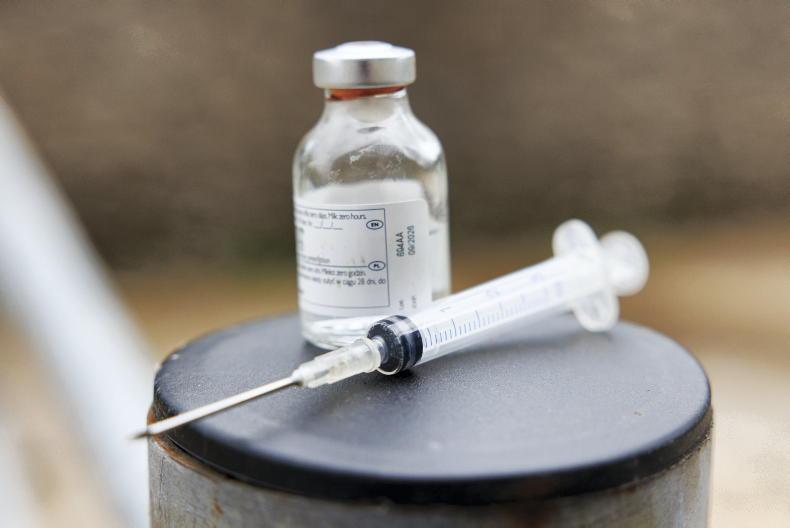
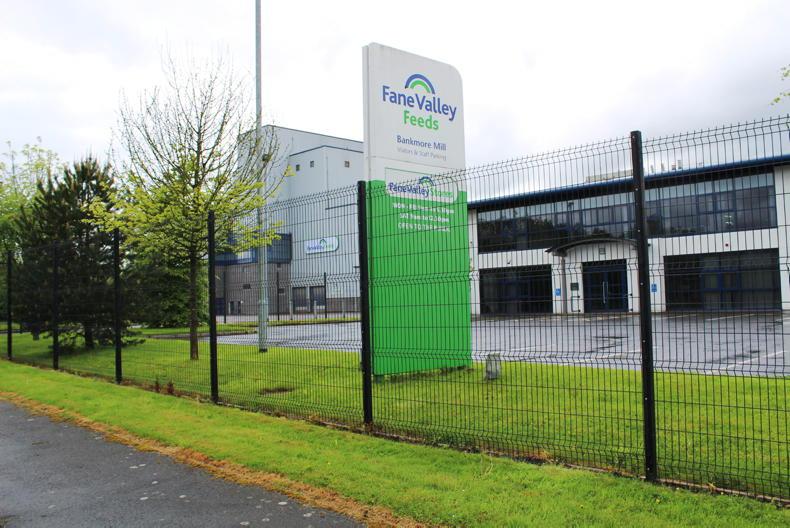
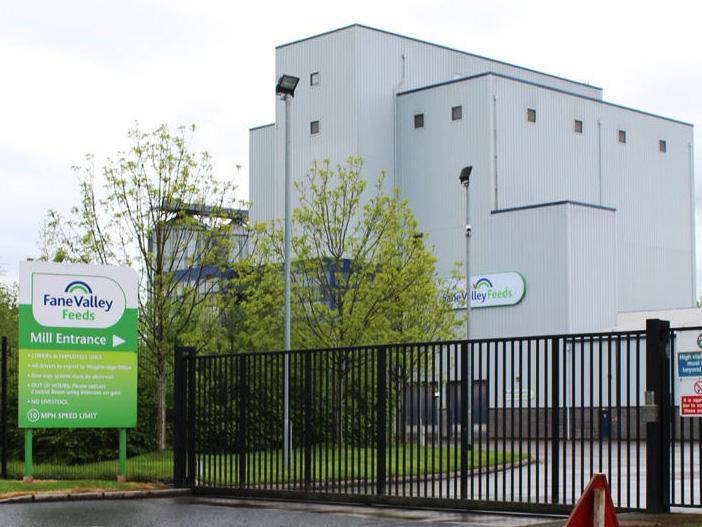
SHARING OPTIONS